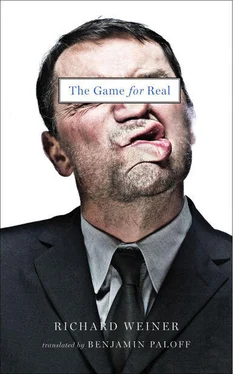To seduce him while he turns his side toward his seducer — that is, to attempt to break a resistance so uncompromising that it no longer even tries to defend itself — and I, having foundered before that stronghold so impregnable and God knows how dearly bought, am just stewing in my shame, but I can be rather pleased with my defeat. Such is the sovereign power of purity, that it softens even the non-will of an evil that has been repelled. Here, however, he’s being seduced by Mutig, who is facing him. Mutig is not held back by the hieratic mask so much as spurred on by the face of the disgusted debauchee, who resists only in order to tease and egg his tempter on.
Before the theatrical house, a banal parallel with the twin Janus head: who is Fuld? He who resists me so easily that I am not even worthy of his defense, or he who forgets to resist Mutig as well? Mutig’s shadow is comical, tipped far across the table, his slightly outstretched arms gesticulating immediately above it: it’s the shadow of a haggling merchant. — But the shadow lies. Mutig is not funny, Mutig is dangerous.
The shadow only comes off as funny. Mutig is urging Fuld toward evil, and Fuld is putting up only a feeble defense. If Fuld doesn’t get reinforcements, Mutig will crush him; Mutig knows this. And he knows that I see them, that I’ve found the game out, that I might be dashing in. How will he hold me back? Mutig’s shadow makes itself repugnant, foul, and funny. Mutig tells himself that no one is rushing to the aid of Fuld, who faces a shadow so repugnant, foul, and funny. Fuld takes no guff. With a creature whose shadow is repugnant, foul, and funny, Fuld can manage quite well on his own. A ploy, a mere ploy. Mutig doesn’t know how to be repugnant, foul, and funny. He is wily and dangerous. Mutig resembles a doe, beautiful and evil, his shadow is only aping a nasty little hound dog, and doing so deliberately. Mutig! It’s a shadow. But behind the shadow are your dark, somewhat squinty eyes, whose speech your mouth merely seconds. Mutig, how much fortitude you would otherwise have to have for your name not to be an ironic commentary on what you really are.
“Mutig is tempting him toward murder, and Fuld is succumbing,” I cried out, not letting them out of my sight. Fuld succumbs to everyone he faces. He can only resist sideways.
Fuld’s shadow turned. Now that organdy mask was facing me head-on as well. Behind their almost downcast lids, the eyes looked ashamed, flashing with gluttonous whims. The ironic smile was acceding to vice and now only sought the how and where-to-go to hide its consent, and at the same time it regretted being enslaved to its own hypocrisy. And if I didn’t spot Giggles from outside as well, it was because her shadow broke before it reached the curtain; she was standing aloof. When I entered, however, she was the first to hail me. She was standing as straight as a candle, her arms hung down, her little head with its tousled hair twisted slightly to the side — such was her habit — and on her face that fleeting smile of a sorrow whose principal distress was in how to put on that it was a simple smile and nothing more. She was standing there like a puppet they were bargaining over, who knows she’s being bargained over, but does not know how to express it, or cannot. All she knows is fear, a slightly theatrical fear, for she is a puppet who is counting on the fact that, should the worst happen, her famously powerful queen, Puppenfee, will intervene. Giggles spotted me, recognized me, but didn’t stir. Fine; but she smiled, she smiled as though shorthand for her customary “Well, come closer, don’t be shy!”
Giggles likes me, but Mutig, her man, despises me with a simmering disdain. He expressed this in the coquettish crossing of his leg and his affable smile, whose evil and untimely wrinkle he hastily wiped from his lips; he expressed it by laying his hands on the table, as if they were suddenly overcome with boredom. Fuld also made it clear that he had seen me, but only in that he bent his head ever so slightly lower, and his fingers, braced against the table, buckled. His knuckles collapsed and clattered.
All of this was in greeting. Here they were as if on stage, each with his assignment and in his appointed place. They were acting. A new act had begun with my entrance, they had known about it from their past rehearsals, they’d been expecting me. I understood right away that I, too, was acting, and I settled into it quickly. As if at the instruction of an invisible director I headed without hesitation for the far side of the table, where Mutig was sitting at one end, Fuld at the other. Thus I had my back to the window, with Giggles opposite me. She was standing back, but in such a way that one would know that she, too, belonged to the group. I mention this because the four of us were not alone in the place. From my position I had a perfect view. It was a spacious hall, with a vaulted ceiling, at the same time it called to mind a subterranean chapel (I thought of La Sainte-Chapelle de Paris, Assisi, and the Gypsy church in Saintes-Maries-de-la-Mer), the beer cellars of Munich, and a knightly hall. It would surely have been echoing were it empty, but now it was full of people. They were sitting at white-clothed tables. You might say they were the spectators at the Théâtre des Variétés, with their obligatory refreshment, yet these spectators had agreed not to order anything. For the tables were bare. This gave a solemn impression and was a bit unsettling. They were mainly men. It was as if our table were the stage they’d come to see, but it was apparent they were paying us no mind at all. They spoke, they clamored — literally, the same kind of din as on the street just a moment ago — as if we weren’t there, though I had no doubt that they were mostly talking about us, that they were like the chorus of the play that the four of us were now acting out; that is, they were gesticulating about our every movement, about our every word, though somehow on the sly. It was discreet, and I found it excruciatingly annoying. Those people had a complexion that was at least olive, though often black, but only a few were of a genuinely Negro sort. As it happens, I don’t know how I even arrived at any certainty as to this circumstance, since most of them had a sort of double-sided hood over their head.
What is just now transpiring, and what is soon to come, is a sort of one-off script.
Having described the “auditorium,” I will depict the general situation on the stage. Each of us was, roughly speaking, as if fixed in the position he was occupying when the curtain went up. I don’t know the cause for the relative motionlessness of my fellow actors, but I well know the cause of my own lethargy, which is to say that as soon as I had arrived at my place at the table (I’ve said that I had retired there as if at the instruction of an invisible director), it was clear to me beyond all doubt that I hadn’t so much wound up somewhere as frozen into something. (And I apologize for that frightful, but unavoidable, turn of phrase, which is the only one that fits.) I knew that I was with the other three in a closed system — as if we had grown into a transparent cube, cut off from the ordinary, phenomenal world. The slightest individual attempt at a turn, a step, a movement was in communication with the entire construct, which would then swing (for it was suspended). In other words: we had not been completely deprived of the ability to move, but whatever any of us undertook, his position relative to the others remained unchanged and was as it had been initially, that is, when “I took up my role.” This is just to explain why, for example, I had no luck in seeing Fuld and Mutig other than in profile, and it follows from this finding that these two were invariably face-to-face. — Giggles is no exception: not for a moment did she cease to be that puppet I’d spotted when I came in, a puppet incapable of expressing whether she was suffering or rejoicing, an awfully timid puppet, yet counting on the power of her queen, Puppenfee. All I want is for the reader to picture it like she was constantly, if almost unnoticeably, swaying, like she was charmingly floating, like she was in the grip of some music that no one else but she could hear, though she might not be able to say who was playing it for her, whether it be the words, the atmosphere, or my own unconscious desire. I would want the reader to picture Giggles a bit like a leaf that submits to the will of waves just a hair before it has circled down upon them, perhaps in the naïve hope that they would have mercy upon it for its having “obliged” them.
Читать дальше












